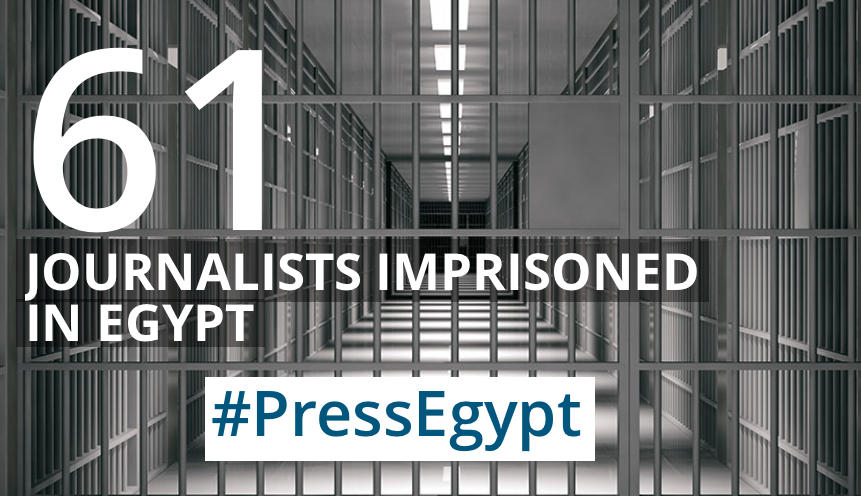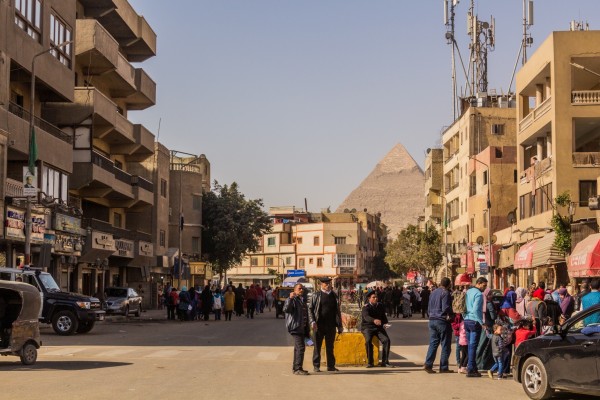The International Press Institute (IPI), a global network of editors, media executives and leading journalists for press freedom, today condemned the continued disappearances and arbitrary detention of journalists in Egypt and called on authorities to immediately release all those swept up in a recent crackdown.
The last three months have seen the biggest wave of arrests of journalists since the brutal clampdown that followed President Abdel Fattah el-Sisi’s rise to power in a military coup in 2014.
At least 25 journalists have been arrested in Egypt since the beginning of September, according to IPI research.
A total of 61 journalists are currently behind bars in Egypt, IPI figures show, making the country one of the top three jailers of media professionals anywhere in the world in 2019.
Mahmoud Hussein of Al Jazeera has been in prison for over three years, whereas Ismail Alexandrani has spent more than 1,400 days in detention. A freelance journalist, Abdullah Shousha, has been in detention for over 2,200 days.
In the latest high-profile case, on December 3, journalist and former head of the Egyptian Journalists Syndicate, Badr Mohamed Badr, disappeared from within police custody a matter of days before being released.
His condition and location are still unknown, and authorities have denied all knowledge of his whereabouts, Ahmed El-Attar, of the Egyptian Coordination for Rights and Freedoms (ECRF), told IPI.
Badr was originally arrested in 2017 on politically-motivated charges of joining a terrorist organization. After more than a year-and-a-half behind bars, on 24 November 2019 an Egyptian criminal court finally issued an order for his release.
The next day Badr was transferred to Giza police station pending his release, where he was visited by his family. Within hours he had vanished under unknown circumstances, prompting fears he had been “disappeared” back into the Egyptian state security services’ notorious detention facilities.
Despite demands for information, the police, the Egyptian Attorney General and Egyptian Ministry of Interior have all denied knowledge of his whereabouts, El-Attar said.
“This latest case of arbitrary disappearance is yet another example of the ruthless tactics the authorities in Egypt resort to in order to silence journalists”, IPI Director of Advocacy Ravi R. Prasad said. “Certain people in Egypt were clearly unable to accept Badr Mohamed Badr’s release and were willing to trample over their own judicial process to ensure he remained imprisoned.”
He added: “Yet again, this year Egypt retains its shameful title of one of the world’s biggest prisons for journalists. Authorities must end their current crackdown and immediately release all those who remain behind bars.”
Detentions prolonged
In recent weeks, several journalists caught up in the recent wave of arrests in Egypt have had their pre-trial detention renewed.
On November 26, freelance journalist Hassan El-Kabany appeared before the country’s state security court after more than 70 days of enforced disappearance, El-Attar said. He has now been charged with joining a terrorist group and spreading false information. El-Kabany was re-arrested on September 17 after being lured into the National Security Agency headquarters in Cairo.
On December 3, blogger Mohamed Ibrahim was remanded in pre-trial custody for another 15 days. A day later, Khaled Dawoud, a journalist and former head of the liberal al-Dustour party, also had his pre-trial detention prolonged. Both face the same three charges of engaging a terrorist organization, spreading fake news and misusing social media and were ordered to remain in preventive detention.
On December 8, the state security court also renewed for another 15 days the pre-trial detention of journalist Esraa Abdel Fattah on the same charges. The blogger and prominent human rights activist has reportedly been beaten and tortured in prison. Earlier this week she renewed a hunger strike against her treatment, according to El-Attar.
A day later, authorities also renewed the pre-trial detention of journalist couple Hossam al-Sayyad and Solafa Magdy for 15 days, on the same charges. The husband and wife were arrested by plainclothes security in the city of Giza near the capital Cairo on November 26 and are close friends of Abdel Fattah.
Largest crackdown in years
The latest wave of arrests followed rare protests against the el-Sisi government which broke out in cities across the country on September 20. Though demonstrations died down, arrests of journalists have continued, signalling that the regime is clamping down further on sources of criticism and dissent.
On November 28, Ahmed Shaker, a journalist with Rose al-Yousef newspaper, was also forcibly disappeared. His whereabouts and charges against him are still unknown.
It is not uncommon for journalists in Egypt to disappear into the State Security Service’s infamous detention facilities for weeks on end. The use of torture during interrogations is widespread.
When detained, the Egypt authorities systematically deny journalists rights to due process and a fair trial in the country’s compromised courts. Many are held for years without official charges and denied the right to legal counsel.
IPI Vice-Chair deported upon arrival to Cairo airport
In a disturbing development, which appears to be yet another display of Egypt’s intolerance of dissenting opinions, Daoud Kuttab, vice chair of IPI executive board and Director-General of Amman based Community Media Network was denied entry into Egypt upon his arrival at Cairo airport.
In a letter to The Egyptian Ambassador to Austria, Mr Omer Amer Youssef, IPI today vehemently criticised Egypt, expressing concern that this may be in retaliation for IPI’s criticism of the government’s failure to respect fundamental rights.
On Friday, Kuttab arrived at Cairo airport from Amman, Jordan, to attend a conference on transparency in Christian institutions in Egypt. Although the immigration official stamped his passport, Kuttab was asked to wait at the passport control. A police officer arrived and asked him the reason for the visit.
Kuttab, a respected Palestinian journalist with a Jordanian travel document, explained that he was there to attend a conference and not as a journalist. After contacting the organizers of the conference, Kuttab was taken to a waiting room and a few hours later deported to Amman.
“The deportation of Daoud Kuttab demonstrates that the Egyptian government is targeting all those who raise their voice against the brutal crackdown on journalists in the county”, Prasad said. “Continued disappearances and arbitrary detention of journalists in Egypt has created a climate of fear in the country.”



